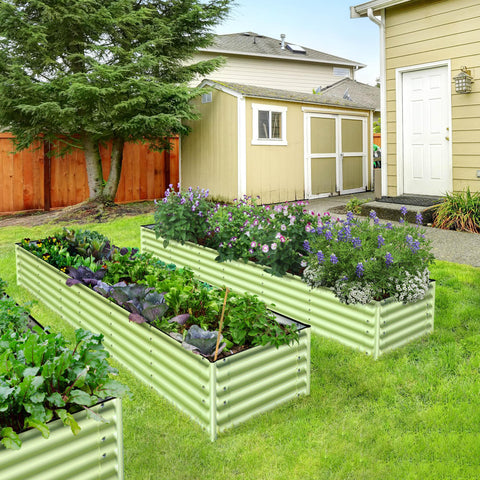Pest Control in Olle Raised Bed Gardens: Safe and Effective Products
Garden lovers are increasingly favoring raised bed gardening. These elevated garden structures offer several advantages, including better soil drainage, improved soil quality, and easier maintenance. However, like any garden, raised beds are not immune to pest problems. To maintain a thriving garden, it's important to have effective pest control strategies in place. In this article, we'll explore safe and effective products for pest control in Olle raised bed gardens.
The Importance of Pest Control
Raised bed gardens have gained immense popularity among garden enthusiasts and home growers in recent years. These elevated gardening structures offer numerous advantages, from improved soil drainage to better control over soil composition. However, one often underestimated aspect of raised bed gardening is pest control. In this article, we will explore the crucial role of pest control in raised bed gardens and why it should be a top priority for every gardener.
- Protecting Your Investment
Creating a raised bed garden requires an investment of time, effort, and resources. From building the raised beds to amending the soil and selecting the right plants, it's a labor of love. Without proper pest control measures, all this hard work can go to waste as pests can quickly ravage your garden, leaving you with diminished harvests and a sense of frustration.
- Preventing Crop Damage
Pests can wreak havoc on your garden, destroying leaves, stems, and even the fruits or vegetables you've worked so hard to grow. Common garden pests like aphids, caterpillars, and slugs can rapidly multiply and consume your plants. By implementing effective pest control strategies, you can safeguard your crops and ensure a bountiful harvest.
- Minimizing Disease Spread
Pests aren't just a direct threat to your plants; they can also serve as vectors for diseases. Many pests carry harmful pathogens that can infect your garden. For instance, aphids can transmit plant viruses, while rodents can carry soil-borne diseases. Managing pests is a crucial step in preventing the spread of diseases that can devastate your entire garden.
- Maintaining Soil Health
In raised bed gardens, maintaining healthy soil is paramount. Pests can undermine soil health by disrupting the balance of beneficial organisms. For example, root-feeding nematodes can harm plant roots and disrupt the symbiotic relationships between plants and soil microorganisms. Effective pest control helps protect your soil's ecosystem and fertility.
- Promoting Beneficial Insects
Ladybugs, lacewings, and parasitic wasps are examples of beneficial insects that help control pest populations naturally. Implementing pest control measures that do not harm these beneficial insects can create a balanced ecosystem where pests are kept in check by their natural predators.

- Sustainable Gardening
Pest control in raised bed gardens can align with sustainable gardening practices. Instead of resorting to chemical pesticides that can harm the environment, consider eco-friendly options like companion planting, neem oil, or introducing beneficial insects. These methods allow you to protect your garden while minimizing the ecological footprint of your gardening efforts.
- Consistent Garden Success
Consistency is key to successful gardening. When you actively manage and control pests in your raised bed garden, you're more likely to enjoy consistent yields year after year. You won't have to deal with the disappointment of seeing your hard work go to waste due to pest infestations.
In the world of raised bed gardening, pest control is not an option; it's a necessity. By prioritizing pest management in your garden, you can protect your investment, ensure healthy crops, and promote sustainable gardening practices. Whether you choose natural or chemical methods, the key is to be proactive and stay vigilant throughout the growing season. With effective pest control, you'll enjoy the full benefits of your raised bed garden and savor the satisfaction of a successful harvest.
How to Control Pest in your raised beds
Gardening enthusiasts often turn to raised bed gardens for their numerous benefits, including improved soil drainage, better control over soil quality, and reduced strain on the back. However, like any other garden, raised beds can be susceptible to pests that can damage or destroy your precious plants. But fear not! With proper pest control measures, you can maintain a healthy and thriving garden. In this article, we'll explore the essential steps to effectively manage pests in your raised bed garden.
Start with Healthy Soil
One of the best defenses against pests is healthy soil. Begin by amending your raised bed with nutrient-rich compost and well-rotted organic matter. Healthy soil promotes strong plant growth, making your plants less vulnerable to pest attacks. A strong, healthy plant is often better equipped to fend off pests and diseases.
Choose Resistant Plant Varieties
Selecting plant varieties that are naturally resistant to common garden pests can significantly reduce the need for chemical interventions. Many garden centers offer pest-resistant varieties, which can be a great asset in your raised bed garden.
Rotate Crops
Crop rotation is a time-tested method to prevent the buildup of pests and diseases in the soil. By changing the location of different plant families each growing season, you disrupt the life cycles of many garden pests, reducing their impact on your crops.

Implement Companion Planting
Companion planting involves strategically placing plants that naturally deter pests next to those that are susceptible. For example, marigolds can deter nematodes, while basil can help protect tomatoes from aphids. Research companion planting options that are suited to your raised bed garden and plant them accordingly.
Practice Good Garden Hygiene
Maintaining cleanliness in your raised bed garden is vital for pest control. Remove dead or diseased plant material promptly, as these can attract pests. Regularly weed the area to eliminate hiding places for insects and rodents.
Use Physical Barriers
Physical barriers can be highly effective in keeping pests out of your raised beds. For example, floating row covers can protect your plants from flying insects while allowing sunlight and rain to reach them. Wire mesh or hardware cloth can help keep out burrowing animals like moles and gophers.
Employ Organic Pest Control Methods
Opt for organic pest control methods before turning to chemical solutions. Some effective options include:
- Handpicking: Inspect your plants regularly and remove pests like caterpillars, snails, and slugs by hand.
2.Neem oil: Neem oil is a natural pesticide that can deter a variety of pests.
3.Beneficial insects: Attract ladybugs, parasitic wasps, and other beneficial insects to your garden, as they can help control pest populations.
4.Homemade remedies: Create homemade solutions like garlic and chili pepper spray or soap and water solutions to deter pests.
Practice Timely Watering
Overwatering can create conditions favorable to certain pests, such as slugs and snails. Be mindful of your watering practices, and use a drip irrigation system or soaker hoses to deliver water directly to the root zone without wetting the foliage excessively.
Monitor Your Garden
Regularly inspect your raised bed garden for signs of pest damage or infestation. Early detection allows for prompt action, which can prevent a minor problem from becoming a major one.

Be Patient and Persistent
Pest control in a raised bed garden is an ongoing process. It may take time to find the most effective methods for your specific situation. Be patient, observe the results of your efforts, and adapt your pest control strategies as needed.
Pest control in raised bed gardens can be both rewarding and challenging, but with the right approach and a bit of patience, you can protect your plants and enjoy a bountiful harvest. By starting with healthy soil, practicing good garden hygiene, and using a combination of organic and physical pest control methods, you can create a thriving and pest-resistant garden in your raised beds. Happy gardening!
Maintaining a pest-free raised bed garden is essential for a bountiful harvest and the enjoyment of your gardening efforts. Fortunately, there are plenty of safe and effective products and methods available to help you combat pests in an eco-friendly way. Whether you opt for neem oil, diatomaceous earth, beneficial insects, or organic pesticides, remember to use them responsibly and in accordance with the product labels. By doing so, you can protect your raised bed garden while also being kind to the environment and the beneficial creatures that share your outdoor space. Happy gardening!
